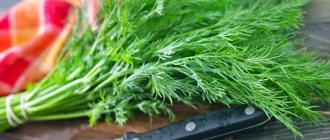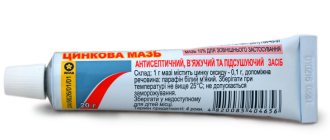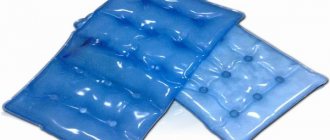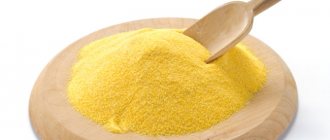The body of a recently born newborn child is trying to get used to its new living and nutritional conditions. The first of the newborn's systems that faces adaptation difficulties is the child's gastrointestinal system.
Getting used to food that is new to the baby, the newborn gradually adapts to it over the course of a month, encountering digestive problems. It is during this month that, due to bloating and gas formation, the child reacts painfully to the appearance of intestinal colic. Almost all babies suffer from this disease and the formation of gases is considered normal.
Modern parents use new means to help their children. Dill water remains an old and familiar remedy for most in the fight against the formation of gases in a newborn.
Imperfect system
The gastrointestinal tract of newborns is an imperfect system in which failures often occur. The child’s gastrointestinal tract is not yet fully populated with beneficial microflora, which contributes to the digestion of food.
In addition, in the first year of a baby’s life, the body is not able to produce all the necessary enzymes. Young children have a very weak pancreas, which is unable to produce the necessary amount of bile for the normal functioning of the gastrointestinal tract.
The biggest problems begin between 2 weeks after birth and three months. At this time, the baby is tormented by the following troubles:
- colic;
- increased gas formation;
- regurgitation,
- unstable bowel movement.
The child feels unbearable pain and cries so much that no one can calm him down. Don't panic. It is better to follow the advice of several generations of parents. They brewed a decoction of dill seeds for their children. We will tell you further what the remedy helps with.
Beneficial features:
- removes waste and toxins;
- promotes the colonization of the gastrointestinal tract with beneficial bacteria;
- relaxes smooth muscles (relieves spasms);
- helps remove gases from the intestines.
Dill seeds have additional properties that act on the body as a whole. A decoction of them:
- normalizes heart rhythm;
- increases immunity;
- relieves the inflammatory process;
- destroys pathogenic microflora;
- acts as a mild hypnotic;
- calms the nervous system.
When consumed, it is worth considering that the decoction stimulates the urinary system. Therefore, the child will urinate more often. During autumn-winter flu epidemics, the use of this infusion is a prevention of respiratory tract diseases. The main thing is to know how to brew dill seeds for newborns correctly.
And if the baby, unfortunately, is already sick, then the product is good at thinning sputum when coughing. It can be consumed not only by the baby, but also by the mother. Especially if she is breastfeeding. Beneficial substances will reach the baby through milk.
How is dill beneficial for children?
Greens are very low in calories: one hundred grams of the product contains only 40 kcal.
Dill contains everything necessary for the human body
, and especially for children, vitamins and microelements such as zinc, iron and many others.
One of the most important elements contained in dill is beta-carotene
- a substance that has the property of being converted into vitamin A, which is very necessary for the body. Thanks to beta-carotene, the child’s general immunity is strengthened, and the child’s body’s ability to withstand various stresses also increases.
If there is a lack of vitamins and microelements in a child’s body, the baby may experience serious health problems, ranging from decreased immunity, due to which the child begins to get sick often, to growth retardation, impaired vision and hearing. That is why greens must be included in a child’s diet, since they, in particular dill, contain a sufficient amount of substances to maintain the normal development of the child’s body.
One of the health benefits of dill is vitamin C.
in large quantities. It is very important that as the child grows, a sufficient amount of this vitamin enters his body, because it plays a big role in strengthening the immune system, and also protects the body from various allergic reactions. A lack of vitamin C will greatly affect the child’s health during the period when he goes to kindergarten, where he begins to come into contact with other children.
Calcium
is a microelement that plays a huge role in the growth process of a child. After all, it is calcium that makes the baby’s bones strong. If there is a deficiency of this element in the body, a lot of different disorders are observed:
- Stunted growth.
- Fragility of tooth enamel.
- Pathological increase in muscle tone.
- Improper functioning of the heart.
How to brew dill seeds for a newborn?
This is a very simple process that anyone can do. Therefore, mother can entrust the preparation to any member of the household.
You will need 250 ml of boiling water and a teaspoon of dill seeds. Fill them with water, cover and let stand for an hour.
Important! Carefully strain the broth through cheesecloth. Seed particles can enter the baby's respiratory tract, which is very dangerous. Pour the infusion into a bottle or other closed container. Now you have homemade dill water, which you can use if necessary. The infusion retains its beneficial properties for at least a month, but pediatricians still recommend using a fresh infusion whenever possible. Prepare it for 3-4 uses.
How and at what age should I give it?
Photo: Depositphotos.com. Author: tanya_ischenko.
Dill is introduced into children's diets from 8 months of age. It is unlikely that the baby himself will express a desire to eat it, so the mother will have to try. The easiest way is to add 5 g to the soup. You can grind the dill using a blender along with vegetables, getting an excellent homemade puree.
After 1.5 years, you can increase the daily consumption to 10 g. At this age, the baby can easily eat dill, in addition to soup, also as part of various vegetable salads. And by chopping the greens with meat broth, you will get an appetizing and healthy gravy for the second course.
Pharmacy analogues
You can buy ready-made dill water at the pharmacy. It contains pure water and a few drops of fennel. The solution is convenient because it can be used immediately after opening the package. Manufacturers often produce dill water in containers similar to ampoules.
The product from TM Happy Baby is considered popular among parents. The price of dill water is about 350 rubles. The product is classified as a dietary supplement. Also in the pharmacy you can often find a drug in granules that need to be diluted with water - “Plantex”. Reviews about it are very good, and the cost is approximately 330 rubles.
Dosage and instructions for use of dill water
Dill water should be taken immediately before feeding the baby. When breastfeeding and bottle-feeding, it is easier to give and dose water from a spoon. However, for artificial people, you can pour it into a bottle. If a new unfamiliar taste causes a refusal to take the product, dill water can be mixed into the formula or expressed breast milk, depending on the type of feeding of the baby. The dosage of the drug depends on the recipe and the characteristics of the baby. If the state of digestion has returned to normal, there is no need to further take the drug. By the first six months of a baby's life, the problem of intestinal colic usually disappears.
Self-cooking
Now you know how to brew dill seeds for newborns. Let's consider the process of preparing a simple analogue. Purchase fennel oil at a pharmacy or specialty store. The latter is pharmaceutical dill. You will need 0.05 g of oil per 1 liter of water. The liquid must be clean. It is advisable to take bottled baby water with an optimal content of salts and trace elements. The water must be boiled. This solution can be stored in the refrigerator for a month.
Among the pharmacy assortment you can now see many granulated teas containing fennel. They can also be used instead of dill water. However, if you choose between natural seeds and such products, it is better to choose a self-prepared product. This way you will know for sure that there is nothing unnecessary in the composition. Next, let's talk about the use of dill seeds in folk medicine.
How to properly store dill water
This drug has a very short shelf life. Therefore, do not use water that has been stored in an open place for more than a day, or in the refrigerator for more than a week. For newborns up to a month old, fresh dill water is prepared for each dose. Remember that in the first months of life, a newborn is easily susceptible to infections. Therefore, carefully monitor the sterility of the utensils, the cleanliness of your hands and water when preparing the drug. Mothers who care about their health and beauty will be interested to know that dill water is also useful for them, to enhance lactation, and the opportunity to take advantage of its rejuvenating effect, which is guaranteed by fennel fruits and dill seeds. And nursing mothers will be interested in the fact that drinking 100 g of dill water half an hour before feeding a baby will very likely relieve him of intestinal colic and improve the composition and production of milk.
What do healers say?
The seeds are actively used in official pharmacology and herbal medicine. Doctors of Ancient Greece and Rome began to use it. First of all, they considered fennel a powerful aphrodisiac. They also used it in the treatment of respiratory diseases, to cleanse the blood and tidy up the central nervous system.
The Slavs also actively used dill seed. A decoction of it was considered a cure for almost any ailment, since it perfectly increased the body's defenses.
Dill water made from dill seeds is used in folk medicine to treat:
- genitourinary system;
- sexual dysfunction;
- flatulence;
- gastritis;
- ulcers.
Also, experts who treat with herbs advise nursing mothers to drink an infusion to improve lactation.
The presence of a large amount of beneficial essential oil in dill seeds helps regulate sleep. They are also recommended for use for depression and other mental disorders.
Herbalists also tell how to brew dill seeds for newborns. This very simple and cheap remedy will help your baby feel much better.
Other greens
For the full development of a child without the use of vitamin complexes, pediatricians recommend adding other greens to food.
- Parsley is rich in vitamin C, so it effectively protects the baby from infections, has pronounced antiseptic properties and improves blood condition.
- Spinach contains a lot of calcium, which strengthens your baby's bones and teeth. No less important for a growing fidget is the high concentration of protein in the green leaves of the plant. It is not recommended to add spinach to baby food more than twice a week.
- Young sorrel leaves will help diversify your child’s menu. They have a beneficial effect on intestinal function and have strong anti-inflammatory properties.
General recommendations and advice
Any new product should be tried by the mother first and the baby should be breastfed. If no negative reaction occurs, then you can give the infusion to the baby.
Buy seeds only from trusted places. In pharmacy chains and specialized herbal stores. You should not purchase them at points of sale for gardeners. Such seeds can be treated with pest control and can cause poisoning.
In this article you learned how to brew dill seeds for newborns. Take advantage of the benefits of nature, and let your children be healthy and happy!
Harm and contraindications
Abuse of aromatic seasoning in some cases can have an adverse effect on the body:
- Dill may help lower blood pressure. If a child has vegetative-vascular dystonia with low blood pressure, then excessive consumption of dill greens can cause headache, dizziness, drowsiness and even lead to fainting.
- A large amount of aromatic seasoning in the diet can cause intestinal dysfunction and stool disorders.
- Greens that appeared on the market early should not be given to children in a hurry, since nitrates could be used to stimulate the growth of dill, which would lead to poisoning of the child. It is better to purchase seasoning collected in season.
- Overuse of dill may be harmful for children prone to seizures.
- Due to the essential oils it contains, dill can cause an allergic reaction in a child.
- The use of medicinal products from dill seeds is contraindicated in case of cholelithiasis and kidney stones.
Herbs and spices that perfectly complement the taste of dill:
- Garlic
- Onion
- Horseradish
- Black pepper
- Bay leaf
- Coriander
- Parsley
- Cilantro
- Caraway
- Cinnamon
- Basil
- Fennel seeds
- Lemon zest
We are not afraid and add me to Odnoklassniki and Instagram!
Did you like the article? Subscribe to site updates
"Encyclopedia of Baby Food"!
Don't forget to bookmark us! (CTRL+SHiFT+D) Subscribe to the site, comment, share on social networks.
On our website Encyclopedia Baby Food there is useful information on the nutrition of your children, which is useful for everyone, and we update the Encyclopedia Baby Food website constantly and try to search and write only excellent, verified and necessary information for you and your children.
Disclaimer #1: It is necessary to understand that the author of the articles on the Encyclopedia Baby Food website is not a medical professional, “I am not a doctor.” The information I share is based on my own experience. My goal is not to teach you how to eat or feed your child, but to tell you about what we did, what new things I learned or read. This allows you to expand your knowledge about baby food, allows you to see the whole process so that you can decide whether you like it or whether it’s worth doing the same.
Disclaimer #2 : However, the above does not replace visiting your pediatrician. Before you start complementary feeding, you should seek his professional opinion on the best way to introduce new foods to your baby. Please also note that you need to look at the original date of published articles, as some “best practices” may have changed. Always consult your child's pediatrician about complementary feeding and his or her health.
Disclaimer #3: Keep in mind that every family is unique, and every situation is completely unique. There are no universal solutions. Only you can find what works best for you. Certain goals require certain sacrifices and priorities—not everyone wants to make those choices, and that's GREAT! Just know what you want to achieve and be ready to get to work doing your best!
Disclaimer No. 4: The Encyclopedia Baby Food website uses photos from books on baby food with attribution for a more complete understanding of the information (Article 1274, paragraph 1, part four of the Civil Code of the Russian Federation). Literature on baby nutrition was found freely available on the Internet.
Apricot puree with chicken Banana-apple puree Banana puree Borscht Broth with peas and rice Kohlrabi sandwich Zucchini jam with strawberries Buckwheat with green peas Buckwheat porridge Buckwheat porridge with apricots Buckwheat porridge with banana Buckwheat pilaf Children's vinaigrette Children's ketchup Children's cucumber salad Children's salad Olivier Baby puree of strawberries, banana, yellow cherries, matsoni and cookies with cereals Baby puree with cottage cheese and fruit Homemade pizza Breakfast outside Baking cauliflower Baked carrots Baked carrots and cherries with millet Cabbage with white beans Mashed potatoes Quinoa and pumpkin porridge Porridge Quinoa porridge for breakfast Quinoa and apple Strawberry puree Strawberry puree with banana Strawberry compote Compote of wild apples and raspberries Compote of dried fruits steamed in a thermos for a child over 8 months Corn porridge Corn porridge with pear Corn porridge with pumpkin Corn porridge with pumpkin and carrots Corn porridge with apple and carrots Chicken cutlets with carrots Chicken with carrots, sweet peppers and potatoes Navy pasta Pasta with orange sauce Carrot and potato puree Carrot and rice casserole Carrots with chicken Amanita from eggs and tomatoes Vegetable puree from cauliflower and carrots Vegetable soup with corn semolina Vegetable soup with cheese and corn semolina Vegetable cream soup with bell pepper Oatmeal Pancakes with hot kefir Omelette in a bag Omelette pancake Peach puree Zucchini and carrot pie Zucchini pie White cabbage pizza Rabbit pilaf Chicken pilaf with green peas and corn Banana and cherry puree Banana, cottage cheese and porridge puree 4 grains Broccoli (cauliflower) puree Broccoli, zucchini and cauliflower puree Blueberry puree Pear puree Pear and banana puree Pear and pumpkin puree 7 months + Pear, pumpkin and peach puree Pear, apple, plum and prune puree Turkey puree Zucchini puree Zucchini and broccoli puree Zucchini, carrot and potato puree Quinoa and banana puree Quinoa and carrot puree Quinoa puree, banana and carrots Quinoa, zucchini and carrot puree Quinoa, peach and raspberry puree Quinoa, cauliflower, apple, pea and mint puree Quinoa, apple, pear and raisin puree Quinoa, apple, carrot puree Rabbit, broccoli puree and cauliflower Chicken, carrot, potato, apple and pea puree Raspberry, cherry and banana puree Carrot puree Carrot and apple puree Carrot, potato, broccoli puree with cheese Carrot, potato, apple and quinoa puree Carrot puree , pumpkin, apple and prunes Carrot, apple and potato puree Turnip and carrot puree Plum puree Cottage cheese, strawberry and banana puree Pumpkin puree Pumpkin and banana puree Pumpkin and zucchini puree Pumpkin and apple puree Pumpkin puree, apple and banana Cauliflower and broccoli puree Cauliflower and potato puree Cauliflower and rice puree Cauliflower and apple puree Cauliflower, green pea and zucchini puree Cauliflower, turkey and potato puree Cauliflower and potato puree and zucchini Cauliflower, carrot and broccoli puree Cauliflower, carrot, cheese and rice puree Cauliflower, apple and zucchini puree Zucchini puree Zucchini and potato puree Zucchini, carrot and apple puree Cherry puree Blueberry puree from prunes Apple, pumpkin, carrot puree and a little curry Apple and pear puree Apple and strawberry puree Apple, strawberry and cherry puree Apple, peach and banana puree Carrot and pumpkin puree Turkey, potato and carrot ragout Zucchini ragout , carrots and broccoli Stew of fish, potatoes, carrots and broccoli Rice porridge Whole grain rice porridge Rice porridge with carrots Rice porridge with pumpkin Rice porridge with apples Rice porridge with apple and pear Rice porridge with apple and pumpkin Fish cutlets with vegetables Semi-finished fish products Fish balls with ketchup Fish soup for a child Fish soup with salmon and celery Carrot and kohlrabi salad Chickpea salad The laziest soup Creamy kohlrabi soup Oatmeal smoothie One-pot sauce Pea and bacon soup Salmon soup Cauliflower soup Soup with meatballs for the picky eater Cream soup of rabbit, pumpkin, potatoes, broccoli and cauliflower Cream soup of pumpkin with mushrooms Cream soup with broccoli and celery Pork soup/stew with potatoes and carrots Cheese pasties Cheese sauce with pumpkin (recipe) Annabelle Carmel) Pumpkin-apple puree Pumpkin-apple juice Pumpkin puree soup Fruit salad Bread lavash Cauliflower with cheese Linden tea and thyme Applesauce Apple juice










